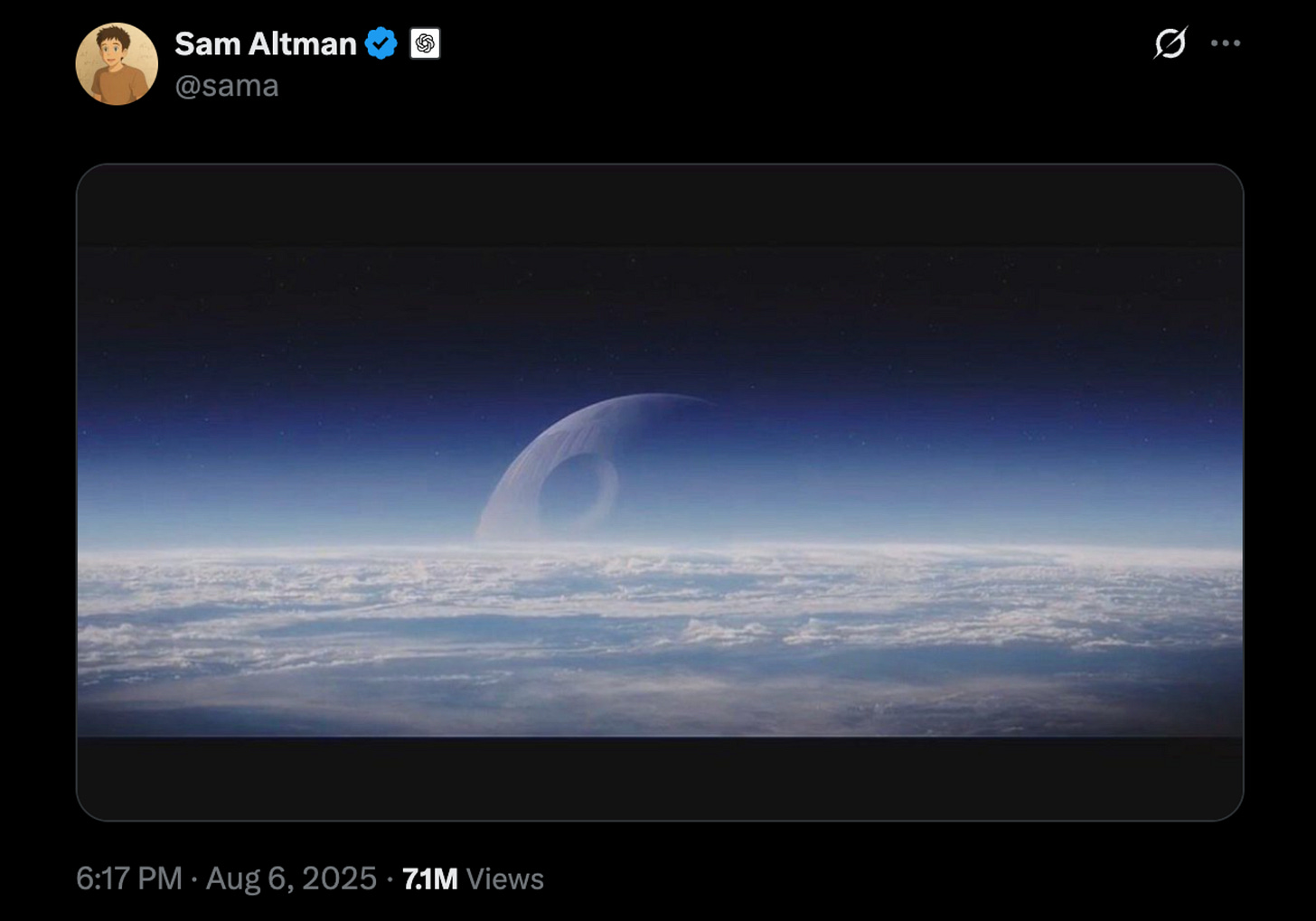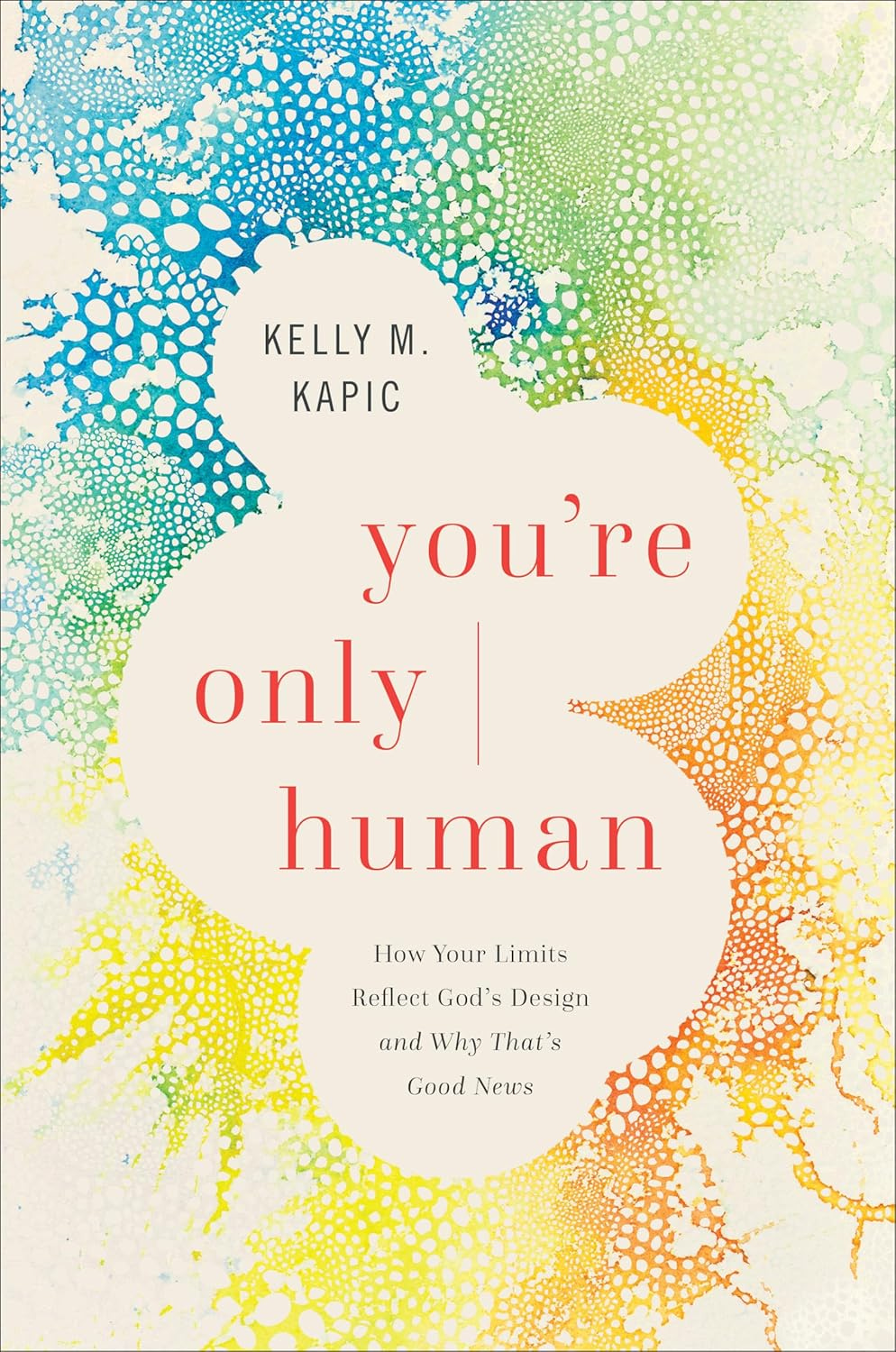The Want of Harmony
Misleading metaphors rule in the age of vibes
Thank you for being here. As always, these essays are free and publicly available without a paywall. If something here resonates, please share it with a friend or consider supporting me with a paid subscription.

Metaphors, like epithets1, must be fitting, which means that they must fairly correspond to the thing signified: failing this, their inappropriateness will be conspicuous: the want of harmony between two things is emphasized by their being placed side by side.
Aristotle in The Rhetoric, Part 2
New AI product releases are a modern Rorschach Test. They serve to either confirm or deny your preconceived notions. Everyone sees what they want to see. The ambiguity is intentional.
There is perhaps no better snapshot of this reality than Sam Altman's tweet a few weeks ago, roughly 16 hours ahead of the livestream release of GPT-5. The tweet is an image, presented without comment or alt text, of a slightly opaque Death Star hovering over an ice-covered surface of Hoth. It is a perfect description for our current moment. OpenAI is the Empire? The Rebels? GPT-5 is like a poorly designed piece of engineering that can blow up planets, but with a vulnerability that can be exploited to take down the whole thing? The ambiguity is on purpose. You decide.
We've reached the era of peak metaphor. Or, to put it in 2025 AI-speak: vibes. The concrete details matter less than the general feelings surrounding them. The specific facts about how these things work, the data they were trained on, the natural resources that they consume, and the way they are polluting our informational world? You want to know those things? Nah, don’t worry about it. Just trust the vibes.
What they can tell you is filled with more metaphor. GPT-5 is "Expert intelligence for everyone" and "our smartest, fastest, and most useful model yet, with thinking built in" (emphasis mine). It may be true that the model is the fastest and most useful yet, but the rest of the description is vibes all the way down. Words like "smartest," "thinking," and "expert intelligence" are all metaphors. Paraphrasing Aristotle: metaphors must be fitting or their inappropriateness will be conspicuous.
What we're hurdling toward is a future where, equipped with our "expert intelligence," we can demonstrate the appearance of intelligence without its substance.
It is hardest to find at the moment we need it most
In a conversation with a group of friends and colleagues last week, one of them made the insightful observation that we are entering a moment where we need practical wisdom more than ever. All the while, AI is increasingly deceiving us that we do not need it or that AI is a substitute for it.
Aristotle's ancient wisdom about metaphor comes not only with a description, but with a prescription too. He says that a metaphor "must fairly correspond to the thing being signified" or else its inappropriateness will become obvious. His prescription, in the next phrase, tells us how to judge: put them side-by-side. Then, their "want of harmony" will be emphasized.
Let's not be deceived by the vibes. Yes, these tools are impressive. They can be useful. But they do not think, feel, reason, or speak. They do not write, research, analyze, or code. What they do is process a series of input tokens from a prompt and find the completion using an interpolative function. They are, as Brad DeLong puts it, "flexible interpolative functions from prompts to continuations." Flexible interpolative functions that can call tools, but flexible interpolative functions nonetheless.
They may be sophisticated. They do not think, reason, or understand like humans. The difference matters. Don't be misled by the vibes. Pursue the want of harmony.
Got a thought? Leave a comment below.
Reading Recommendations
Claus Wilke continues his masterclass of communication advice with a post on the assertion-evidence approach. When I first learned about the assertion-evidence framework a decade or so ago (from Jean-luc Doumont), it totally changed the way I give my talks. For my money, there is no single idea that is more powerful for giving effective presentations. See his previous installments on why you should read out all the text on your slides and practice your talks with a presentation speedrun. I’ll do my best to be the first one to pre-order the book that I’m hoping Claus will write to pull all this together.
Your slides are not your talk. A strong speaker can take almost any slides and turn them into an engaging presentation. In fact, a strong speaker can hold an audience enthralled without any slides at all.1 And yet, slide design matters. Bad slides can get in the way of giving a good talk, and excellent slides can elevate your presentation. Also, importantly, the right slides can help you if you’re sometimes struggling as a public speaker. Here, I will present a simple design framework that takes but minutes to adopt and that will massively improve your slides and your public speaking.
James M. Lang writes in The Chronicle about how to teach a good first day of class (paywalled, unfortunately). He suggests centering four principles:
Curiosity
Community
Learning
Expectations
On that first day, I would argue, your students are forming a lasting impression not just of you as a teacher but of your course, too. Their early, thin-slice judgments are powerful enough to condition their attitudes toward the entire course, the effort they are willing to put into it, and the relationship they will have with you and their peers throughout the semester.
The Book Nook
I picked up Kelly Kapic’s book You’re Only Human on the recommendation of a friend. Kapic, who teaches theology at Covenant College, wrote this book to redeem the value of limitations. It feels like a timely message for our moment of artificial intelligence and the obsession with augmenting ourselves.
What I mean is that we must rediscover that being dependent creatures is a constructive gift, not a deficiency. Clever readers might even notice that using “dependent” as an adjective for “creature” is basically redundant—there are no creatures who are not, by their very nature, dependent beings. Our dependency does not merely point to abstract ideas of divine providence, but takes concrete form when we rely on others, on the earth, on institutions and traditions. We must learn the value and truthfulness of our finitude, eventually getting to the point where we might even praise God for our limits.
The Professor Is In
Back on the west coast and one week of my new sabbatical work with Praxis in the books. More to come on that in future weeks…
Leisure Line
Looking for a front basket for your Aventon Abound cargo bike? Look no further. This big front basket from AIMA is great and fits like a glove. Gave it its maiden voyage on the way to the kids’ swimming lessons yesterday, and it worked great. Pro tip: pairs well with a $5 motorcycle cargo net from Harbor Freight.
Still Life
Brain Flakes are all the rage in the Brake household these days. Fun for kids and kids at heart (read: me) alike.
NB: Epithet is from the Greek word epitithenai, which means "to put on" or "to add." In Aristotle’s time, it simply referred to a descriptive phrase. In our modern day, it tends to have a more negative connotation. It is left as an exercise to the reader to decide how to interpret it in this context.






Thanks for the mention!
I've always liked William James's update to Aristotle's point. He used the phrase "agree with reality," which nicely illustrates his metaphysics of relations. There is no point in talking about a universe separate from our experience of it, but that doesn't mean anything goes. Even though language can work against us, there is value it the attempt to have it fit our experience of the universe rather than think we can impose our understanding upon it by proclamation.
Even more interesting to me than that DeathStar tweet was Altman's recent "concerns" about AI being a bubble. I expect this is brilliant...he is the PT Barnum of our digital age. Despite being the chief bubble blower of AGI futures, this will let his followers point to Altman's prescient call if the AI investment bubble pops. As you say, it gives "the appearance of intelligence without its substance."